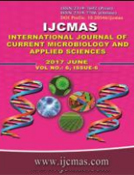


 National Academy of Agricultural Sciences (NAAS)
National Academy of Agricultural Sciences (NAAS)

|
PRINT ISSN : 2319-7692
Online ISSN : 2319-7706 Issues : 12 per year Publisher : Excellent Publishers Email : editorijcmas@gmail.com / submit@ijcmas.com Editor-in-chief: Dr.M.Prakash Index Copernicus ICV 2018: 95.39 NAAS RATING 2020: 5.38 |
Agricultural and horticultural applications of sewage sludge are becoming popular as a means of nutrient recycling in many areas of the world (Jacobs, 1981). Guidelines on application of sewage sludge should take account of many factors, such as sludge type, time and method of application (Shepherd, 1996). Because of a growing need to apply municipal sewage sludge on agricultural lands, there is a developing urgency to have criteria for disposal practices that will preserve the productivity of these lands and enhance the productivity and quality of crops (Chaney et al., 1987). The objective of this study, therefore, was to investigate the effect of sewage sludge on growth and yield of marigold (Targets erecta) to combat the scarcity of chemical fertilizers and their negative residual impact on soil physico-chemical properties. Results indicated that sewage sludge can be safely used as a rich organic matter for realizing marigold yield inside of inorganic fertilizers with ecofriendly manners. Among treatments, T5 (100% sewage sludge) was found to be significantly superior in all observed parameters.
 |
 |
 |
 |
 |